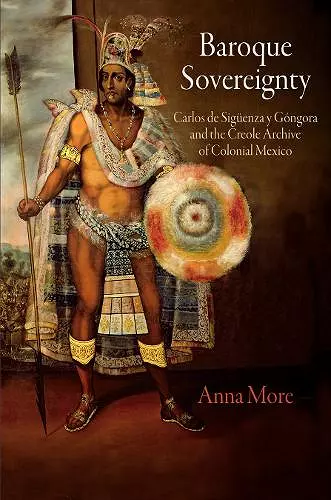Baroque Sovereignty
Carlos de Sigüenza y Góngora and the Creole Archive of Colonial Mexico
Format:Hardback
Publisher:University of Pennsylvania Press
Published:2nd Jan '13
Currently unavailable, and unfortunately no date known when it will be back

Baroque Sovereignty examines the emergence of a creole archive of artifacts, history, and traditions of colonial Mexico, primarily curated by the polymath Carlos de Sigüenza y Góngora. Anna More posits the centrality of this archive for understanding how a local political imaginary emerged from the ruins of Spanish imperialism.
Baroque Sovereignty examines the emergence of a creole archive of artifacts, history, and traditions of colonial Mexico, primarily curated by the polymath Carlos de Siguenza y Gongora. Anna More posits the centrality of this archive for understanding how a local political imaginary emerged from the ruins of Spanish imperialism.
In the seventeenth century, even as the Spanish Habsburg monarchy entered its irreversible decline, the capital of its most important overseas territory was flourishing. Nexus of both Atlantic and Pacific trade routes and home to an ethnically diverse population, Mexico City produced a distinctive Baroque culture that combined local and European influences. In this context, the American-born descendants of European immigrants—or creoles, as they called themselves—began to envision a new society beyond the terms of Spanish imperialism, and the writings of the Mexican polymath Carlos de Sigüenza y Góngora (1645-1700) were instrumental in this process. Mathematician, antiquarian, poet, and secular priest, Sigüenza authored works on such topics as the 1680 comet, the defense of New Spain, pre-Columbian history, and the massive 1692 Mexico City riot. He wrote all of these, in his words, "out of love for my patria."
Through readings of Sigüenza y Góngora's diverse works, Baroque Sovereignty locates the colonial Baroque at the crossroads of a conflicted Spanish imperial rule and the political imaginary of an emergent local elite. Arguing that Spanish imperialism was founded on an ideal of Christian conversion no longer applicable at the end of the seventeenth century, More discovers in Sigüenza y Góngora's works an alternative basis for local governance. The creole archive, understood as both the collection of local artifacts and their interpretation, solved the intractable problem of Spanish imperial sovereignty by establishing a material genealogy and authority for New Spain's creole elite. In an analysis that contributes substantially to early modern colonial studies and theories of memory and knowledge, More posits the centrality of the creole archive for understanding how a local political imaginary emerged from the ruins of Spanish imperialism.
"This book will become a landmark in the study of colonial Latin America, not just the literature but the entire culture, including most specially politics. More proves, with theoretical and scholarly authority, that a creole archive emerged in seventeenth-century Mexico, that it incorporated in complex ways the pre-Hispanic past, and that the chief keeper of the archive was Carlos de Sigüenza y Góngora." * Roberto González Echevarría, Yale University *
ISBN: 9780812244694
Dimensions: unknown
Weight: unknown
360 pages